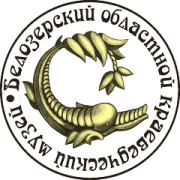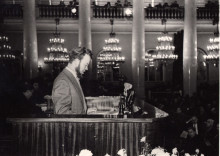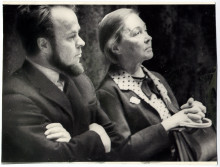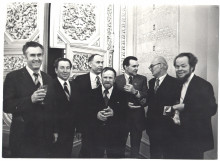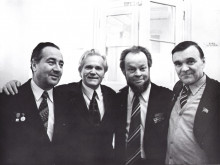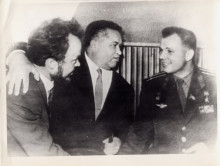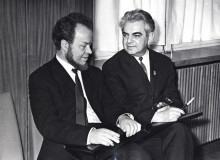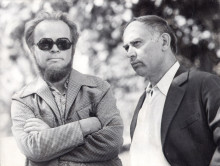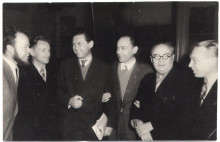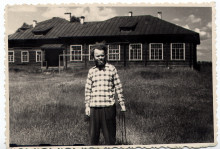Versts
Megra is a lakeside village located 40 km away from Belozersk. The village was flooded when the Volga-Baltic Waterway was being constructed. It is Sergey Orlov’s birthplace.
It is a strip of land between White Lake and the bypassing canal with a number of log houses there. A river flew throughout the village. A berth was located near the canal. A flood-gate was constructed.
No one could say that Megra was out in the sticks either when the poet was born or later. On the contrary, it was a crowded cross point of waterways. Young people living in the village met there, on the canal embankment, or on the towpath as it used to be called. People waited for ships to moor and, correspondingly, their countrymen and just friends. Megra was a cultural village having around 300 houses, a first-aid station, a library, a school, and a steam mill which generated electric power to lighten the village.
Mga
Our country got to know the name of this small village and railway station in the tough period of 1941 — 1942. Leningrad’s fate was at stake during hot battles near Mga in those days.
By the end of August, the Leningrad frontline was connected with other regions of our country by just one railway – via the Mga station – Volkhovstroy and Tikhvin. When Mga was sieged and the fascist troops came close to the Neva near the village of Ivanovskoye, the last main railway line connecting Leningrad with other regions was shut down.
In February 1943, after breaking the blockade and constructing a railway from Shlissenburg to Polyany, it was possible to ensure railway inland connection between Leningrad and the Big Land.
The tank regiment was transferred from one place of the Volkhov frontline to another one to break the blockade but the same things were everywhere: shrub forests chopped by explosions, rare small hills occupied by enemies, timber bridges and river beds along which disguised tanks were moving to the front end. Sergey Orlov crossed such springy, completely wet, bridges a lot of times. He used to reconnoiter battling, take the enemy’s heights, loose his fellow soldiers and fade back. Once he did recognized both the bridge and the black boggy river while passing by the Mga station in a local electric train car. It was a usual suburban train moving from that bridge to Mga for six or seven minutes only but Sergey’s tank regiment was covering this distance over a year: from February 1943 to January 1944.
After breaking the blockade and strengthening their positions at new military lines, the Leningrad frontline troops began actively preparing for debellation of Hitler’s forces near Leningrad.
Gora
On February 17, 1944, Sergey Orlov was wounded and burnt. The tank troops led by Senior Lieutenant Sergey Orlov had a military mission to retake this small village in the Pskov region, near the Utorgosh station, and move forward in the general direction to Utorgosh which now played a very important strategic role under so rough conditions on the frontline.
Three soldiers of the tank crew died in this battle. Sergey Orlov and his tank operator had a chance to take out of the burning tank.
Sergey Orlov mentions this battle in his autobiography as follows: “In 1944, my fellow soldiers carried me, with my burnt skin, on a hack-barrow to a field hospital. Later on, I was out of service for physical disability reasons”.
Cherepovets
At the beginning of April 1944, Sergey Orlov was suddenly transferred to the evacuation hospital No. 1931 in Cherepovets. His hometown Belozersk was now so close but all skin burns were healing over very slowly.
In Cherepovets Sergey Orlov started to write down his poems in the so called “hospital” notebook because he had no idea what had happened to his shabby frontline copybook. He made a drawing of a tank with a star on its turret and a birch tree waving in the breeze on the cover page of this notebook which was hand-stitched of newspapers…
Sergey Orlov copied most of his poems written on the Volkhov frontline into this new “hospital” notebook. He wrote down them by hand using violet ink and getting over pain caused by his burnt hands and eyes. Later on, he used one more notebook which had no cover page but was lined and filled with poems. And the draft poem, the most famous one, survived in this notebook…
Leningrad
Sergey Orlov began studying at the Leningrad University in 1945 but he did not graduate from it.
He led the Poetry Department of the Neva magazine, published his poems in other publications, was elected as a member of the Leningrad Writers Organization Board. He was elected as a deputy of the Leningrad Council of Workers' Deputies several times.
The Neva magazine not just published poems of young poets but helped each one appear before their readers in close up publishing, for example, cycles of poems, narrative poems (R. Kazakova, O. Shestinsky, S. Davydov, M. Borisova, V. Toropygin, A. Romanov, etc.). As a rule, the editorial team wished all the best to young poets but continued publishing their poems again and again in future.
“Chepunov, Dudin, Khaustov, Davydov – they were walking along prospects and streets in Leningrad for many hours and were talking, talking, talking… V. Toropygin commented on it some years later: “Now, when I am thinking back on my early days, my first years as a university student, and trying to identify primary personality traits and specifics of creative activities of Sergey Orlov who was also a student but seven years older compared to his fellow students entering the university in the postwar period but not after high school — my idea is that the primary specific feature is searching for values” (I. Pankeev).
Moscow
Sergey Orlov moved to Moscow in 1970 after being appointed as a Secretary of the RSFSR Writers’ Guild Board. He also became a member of the Lenin and State Prize Committee in Literature, Architecture and Arts of the Council of Ministers of the USSR at that period.
Sergey Orlov’s activities in the administration office were very active. He met young writers, helped frontline poets, organized meetings of Russian writers, went abroad, had meetings with soldiers and military officers of different military bases, arranged poetry parties upon requests of workers and clerisy, prepared his new books of poems for publication.
